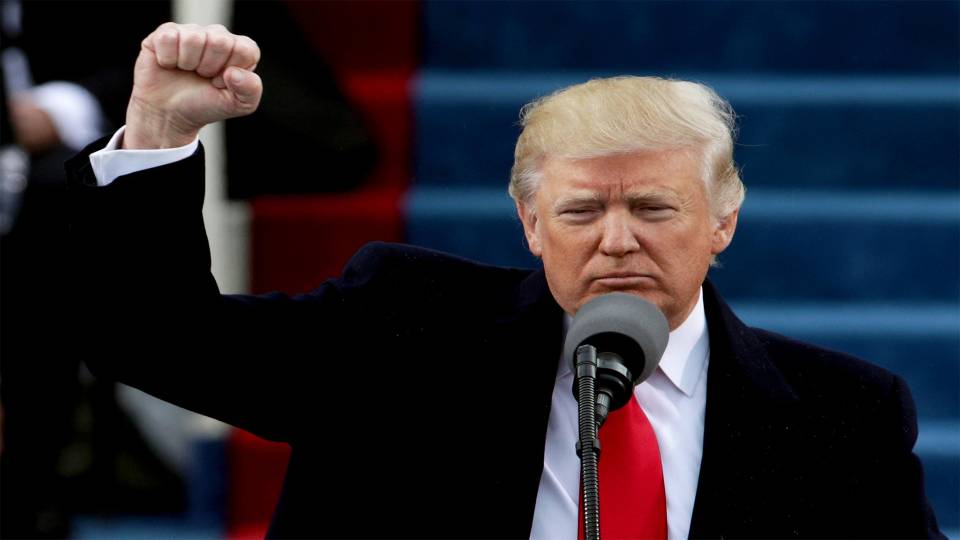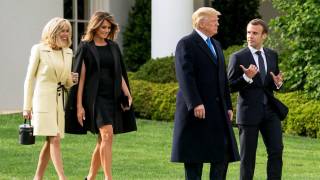Trump Expected to Exit Iran Deal, Europeans Say; Tehran Defiant
U.S. President Donald Trump is expected to announce on Tuesday that he is pulling out of the Iran nuclear deal, European officials said, after they struggled to persuade him that the accord has halted Iran’s nuclear ambitions.
One senior European official closely involved in Iran diplomacy said U.S. officials had indicated late on Monday that Trump would withdraw from the agreement, but it remained unclear on what terms and whether sanctions would be reimposed.
European officials believe Trump may not renew sanctions waivers, a move which would in effect end U.S. participation in the deal. Britain is deeply pessimistic about Trump’s announcement, a senior British diplomat said.
A senior Western diplomat said France, Britain and Germany - also party to the accord - were working on the assumption of a hard U.S. exit after a call last week between U.S. Secretary of State Mike Pompeo and European officials at which he made clear talks on rescuing the deal would not go further.
“He let it be known that it was over,” the diplomat said.
Such a move could ratchet up tensions in a region riven with interrelated wars, including the multi-layered conflict in Syria, where Iran’s presence has brought it into conflict with Israel.
Word of Trump’s apparent choice coincided with a spate of defiant Iranian statements asserting the deal’s demise would not harm its economy, and Tehran did not fear U.S. military attack.
“Our enemies including America, the Zionist regime (Israel) and (their) allies in the region should know Iran has prepared for the worst scenarios and threats,” Revolutionary Guard deputy commander Hossein Salami said.
Trump planned to discuss his decision in a phone call on Tuesday with French President Emmanuel Macron, a senior White House official said.
Trump has consistently threatened to pull out of the 2015 agreement because it does not address Iran’s ballistic missile program or its role in wars in Syria and Yemen, and does not permanently prevent Tehran from developing nuclear weapons.
European leaders have warned a U.S. withdrawal would undo years of work that has kept nuclear arms out of Iran’s hands.
In Washington, Ed Royce, the Republican chairman of the U.S. House of Representatives Foreign Affairs Committee said the United States should continue to fix flaws in accord and “enforce the hell” out of it, but not withdraw.
“NEGATIVE DECISION”
Several European officials stressed they had no concrete information and Trump could still change his mind when he makes the announcement at 2 p.m. (1800 GMT).
White House legislative director Marc Short told reporters that Trump planned to make calls to lawmakers ahead of his afternoon announcement.
“He wants to see Iran not only end its nuclear program but also become ... a nation that is not funding terrorism, not attacking Israel, not looking to continue to attack allies that we have,” he said.
The Republican leader of the U.S. House Armed Services Committee, Mac Thornberry, said he assumed Trump would withdraw from at least part of the deal. Thornberry said that while he didn’t like the agreement, he favored staying with it because of the insight it gave into Iran’s weapons activities.
“We don’t have enough (insight) but it gives us more than we would have otherwise,” he told Fox News.
Iran’s Armed Forces Chief Major General Mohammad Bagheri said Iran’s military power would defuse any threat to Tehran. Israeli Prime Minister Benjamin Netanyahu accused Iran of deploying “very dangerous weapons” in Syria to threaten Israel.
A decision to quit the deal could also rattle oil markets due to Iran’s role as a major exporter, and critics say it could also harm Trump’s efforts to reach a nuclear deal with North Korea, a prospect he has dismissed.
While Iran suggested its economy would not be hurt whatever happened, its rial was near record lows against the dollar in the free market as Iranians tried to buy hard currency, fearing financial turmoil if Trump quits the deal.
‘STAND ON OUR OWN FEET’
“One man in one country might create some problems for us for a few months, but we will overcome those problems,” President Hassan Rouhani said. “If we are under sanctions or not, we should stand on our own feet.”
Even before the latest standoff, a raft of business deals including plane purchases have been delayed amid bankers’ concerns that the nuclear accord could unravel or that they could fall foul of U.S. financial controls.
Whatever Trump’s decision, those concerns are unlikely to ease any time soon as the fallout from weeks of uncertainty and the appointment of a more hawkish U.S. foreign policy team expose underlying obstacles, bankers said.
The deal, negotiated during the administration of Trump’s Democratic predecessor Barack Obama, eased economic sanctions on Iran in exchange for Tehran limiting its nuclear program.
Trump has called it the “worst deal ever negotiated” and he wants Britain, France and Germany to toughen up the terms.
Under the formally titled Joint Comprehensive Plan of Action (JCPOA), the United States committed to ease a series of U.S. sanctions on Iran and it has done so under “waivers” that effectively suspend them.
WAIVERS
International Atomic Energy Agency chief Yukiya Amano has said the world’s most robust nuclear verification regime was in Iran. If the deal failed it would be a great loss.
A senior Iranian official said Iran would not accept any demands on top of those it agreed in the deal, and Trump would be responsible for all the consequences of the deal’s collapse.
The Kremlin said on Tuesday a U.S. withdrawal from the nuclear deal would have harmful consequences.
Israel is widely believed to be the only nuclear-armed state in the Middle East, although it neither confirms nor denies possessing atomic weapons.
Financial markets are watching Trump’s decision closely. On Tuesday, oil retreated from 3-1/2 year highs as investors waited for Trump’s statement.






















